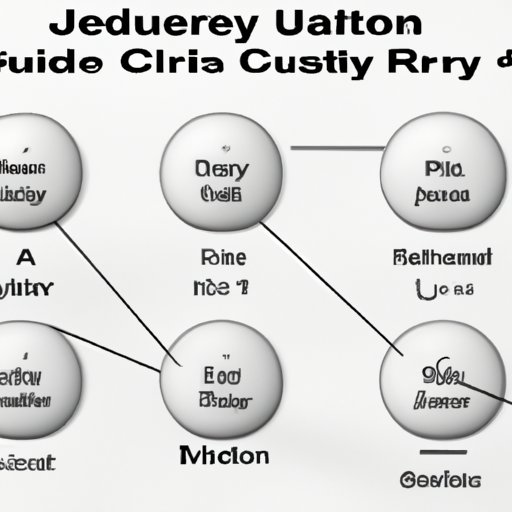Introduction
Jury selection is an important part of the criminal justice system. In the United States, it is a process that is used to determine which people will serve on a jury for a trial. It involves choosing individuals who are likely to be unbiased and fair when evaluating the evidence presented at trial. The purpose of this article is to provide an overview of how jury selection works and how it is used to ensure a fair and impartial jury.

A Step by Step Guide to Understanding Jury Selection
The jury selection process begins before the trial even starts. During the pre-trial preparation phase, attorneys from both sides meet with the judge to discuss any legal issues that may arise during the case. They also review potential jurors’ backgrounds and qualifications to make sure they are qualified to serve on the jury. During this phase, the attorneys can also challenge potential jurors if they feel they are not suitable for the case.
Once the pre-trial phase is complete, the jury selection process begins. This process is known as “voir dire” and it is used to determine which potential jurors are suitable for the case. During this process, the judge and attorneys ask potential jurors questions about their background and beliefs to determine whether or not they would be impartial and fair when evaluating the evidence. Potential jurors who demonstrate bias or have a conflict of interest are usually dismissed from the jury pool.
Exploring the Different Aspects of Jury Selection
During the voir dire process, attorneys have the opportunity to ask potential jurors questions about their life experiences, beliefs, and opinions. These questions can range from general inquiries about the person’s background to more specific questions about their views on certain topics related to the case. Attorneys use these questions to identify potential jurors who may be biased or have a conflict of interest. Attorneys also use the questions to get to know the potential jurors better and assess their suitability for the case.
Attorneys play an important role in jury selection. They are responsible for deciding which potential jurors should be dismissed from the jury pool. Additionally, they must present arguments to the court in support of their decisions to dismiss potential jurors. Attorneys are also responsible for making sure that the jury selection process is conducted fairly and in accordance with the law.
One of the biggest challenges faced during jury selection is finding potential jurors who are unbiased and impartial. It is important that jurors be unbiased and open-minded so that they can properly evaluate the evidence presented at trial. However, it can be difficult to determine whether or not a potential juror is biased or has a conflict of interest. To address this issue, attorneys must carefully question potential jurors and assess their responses.
Examining the Rights and Responsibilities of Jurors
Once a jury has been selected, each juror has certain rights and responsibilities. Jurors have the right to receive information about the case, ask questions, and request clarification on legal issues. Additionally, they have the responsibility to listen to all of the evidence and render a verdict based solely on the evidence presented at trial.
It is important for jurors to understand the legal implications of serving on a jury. If a juror fails to fulfill their duties, they may be held liable for any damages resulting from their negligence. Additionally, jurors may be required to testify in court if their decision is challenged. Therefore, it is important for jurors to take their responsibilities seriously and to remain impartial throughout the trial.

How Voir Dire is Used in Jury Selection
Voir dire is an important part of the jury selection process. It is a process in which potential jurors are questioned by the judge and attorneys to determine their suitability for the case. During voir dire, attorneys can ask potential jurors questions about their background, beliefs, and opinions. This allows them to identify potential jurors who may be biased or have a conflict of interest.
Voir dire has both advantages and disadvantages. On the one hand, it allows attorneys to identify potential jurors who may be biased or have a conflict of interest. On the other hand, it can be time consuming and expensive. Additionally, some potential jurors may be uncomfortable answering personal questions in front of a large group of strangers.
Analyzing the Pros and Cons of Jury Selection
Jury selection is an important part of the criminal justice system. It ensures that trials are conducted fairly and impartially by selecting jurors who are unbiased and open-minded. There are many advantages to jury selection, including allowing attorneys to identify potential jurors who are unsuitable for the case, ensuring that jurors are knowledgeable about the law, and providing a sense of accountability for the jury.
However, jury selection also has its disadvantages. For example, it can be time consuming and expensive. Additionally, there is always the possibility that some potential jurors may be biased or have a conflict of interest. Finally, some potential jurors may be uncomfortable answering personal questions in front of a large group of strangers.

Investigating the Legal Precedents Surrounding Jury Selection
When conducting jury selection, it is important to consider the legal precedents surrounding jury selection. There have been several court cases in which the jury selection process was challenged on the grounds that it resulted in discrimination or was conducted unfairly. These cases have set important legal precedents that must be taken into consideration when conducting jury selection.
It is also important to investigate the impact of previous cases on the jury selection process. For example, in the case of Batson v. Kentucky (1986), the Supreme Court held that it is unconstitutional to exclude potential jurors solely on the basis of race. This decision had a significant impact on the jury selection process and set a precedent that must be followed when selecting jurors.

Comparing Jury Selection Across Different Jurisdictions
Jury selection procedures vary from jurisdiction to jurisdiction. Generally speaking, most jurisdictions use voir dire to select jurors. However, there are some variations in the way voir dire is conducted. For example, some jurisdictions allow potential jurors to be questioned individually while others require them to be questioned in a group setting. Additionally, some jurisdictions allow attorneys from both sides to question potential jurors while others only allow the judge to do so.
It is also important to note that some jurisdictions use different methods for selecting jurors. For example, some jurisdictions use jury pools while others use random selection. Additionally, some jurisdictions use technology to assist in the jury selection process while others rely solely on the traditional method of voir dire.
Conclusion
Jury selection is an important part of the criminal justice system. It ensures that trials are conducted fairly and impartially by selecting jurors who are unbiased and open-minded. The jury selection process begins with pre-trial preparations and then moves on to voir dire, during which attorneys question potential jurors to determine their suitability for the case. Additionally, it is important to consider the legal precedents surrounding jury selection and to compare jury selection procedures across different jurisdictions.
In conclusion, jury selection is a complex process that requires careful consideration and attention to detail. By understanding how jury selection works and exploring the different aspects of the process, attorneys can ensure that trials are conducted fairly and impartially.
(Note: Is this article not meeting your expectations? Do you have knowledge or insights to share? Unlock new opportunities and expand your reach by joining our authors team. Click Registration to join us and share your expertise with our readers.)
